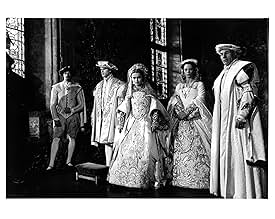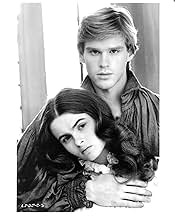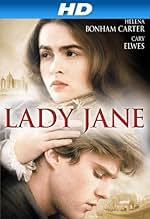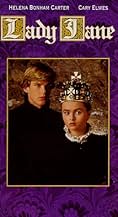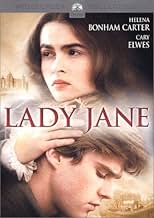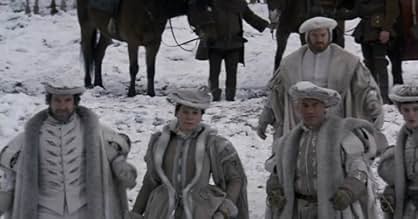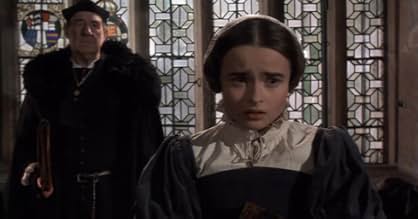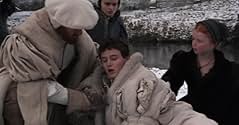La muerte del Rey Enrique XVIII crea caos en el reino por las disputas sobre su sucesión. Ansioso por mantenerse fiel a la Reforma, el ministro John Dudley casa al moribundo hijo del rey con... Leer todoLa muerte del Rey Enrique XVIII crea caos en el reino por las disputas sobre su sucesión. Ansioso por mantenerse fiel a la Reforma, el ministro John Dudley casa al moribundo hijo del rey con Lady Jane Grey.La muerte del Rey Enrique XVIII crea caos en el reino por las disputas sobre su sucesión. Ansioso por mantenerse fiel a la Reforma, el ministro John Dudley casa al moribundo hijo del rey con Lady Jane Grey.
- Dirección
- Guionistas
- Todo el elenco y el equipo
- Producción, taquilla y más en IMDbPro
Opiniones destacadas
However, there is much to recommend. If you're wondering how accurate Lady Jane is to history, in places it does play fast and loose(the romance being the biggest one) but most of the time it is accurate(especially with Jane's execution), at least it didn't feel grossly distorted and gratuitous like Henry VIII with Ray Winstone did. First off, Lady Jane is incredibly well-made, the costumes, sets and scenery are colourful and immaculate in detail(perhaps too much so at times), the lighting is dynamic and the photography is beautiful. The script doesn't do as good a job with developing the supporting roles but does a wonderful job with Jane, who goes through several character stages. The dialogue is thoughtful and avoids being too mawkish. The story is compellingly told and plausible on the whole, despite a few pacing lulls and that one conflict in the central romance, there's plenty to be entertained by and the ending is truly emotional. The romance is not 100% believable and has an 1980s feel at times, but it was also rather touching and the chemistry between Helena Bonham Carter and Cary Elwes smolders. Trevor Nunn directs beautifully, and Lady Jane is very well cast and acted. Helena Bonham Carter is both sexy and fiery but in the later parts she's heartfelt as well, while Cary Elwes is similarly excellent. John Wood's Northumberland is one of his serious roles and he does great at being sinister and Patrick Stewart plays a scheming, cold-hearted character menacingly and movingly. Jane Lapotaire is a haunting Mary and Michael Hordern and Sara Kestelman's performances are fine too.
In conclusion, imperfect but well done. 7/10 Bethany Cox
Legally, in fact, the position was complicated. Mary, like her sister Elizabeth, had been declared a bastard by their father Henry VIII. Towards the end of his life, however, Henry had passed the Third Succession Act, which restored his daughters to the line of succession without formally legitimising them. Edward, as he lay dying, had executed a will excluding Mary and Elizabeth from the succession and naming his cousin Jane as his successor, although, because this will had not yet been ratified by Parliament at the time of his death, Mary's supporters argued that it carried less weight than Henry's Act. Jane was proclaimed Queen by the Privy Council, who then promptly abandoned her when they realised that Mary enjoyed more popular support and that attempts to prevent her accession were doomed to failure.
"Lady Jane" was the third British film about Jane's life after a silent version from the 1920s and "Tudor Rose" from 1936, neither of which I have seen. It was made in 1986, during the "Thatcher Years", to a script by the well-known left-wing playwright David Edgar, so it is perhaps unsurprising that it is essentially Tudor history rewritten to suit the Guardian-reading classes of the 1980s. It is a curious mixture of costume drama and political tract, of fact and fiction. It follows the essential outlines of Lady Jane's story but contains two major divergences from historical fact.
The first of these concerns the relationship between Jane and her husband Lord Guilford Dudley. At first Edgar paints them as they are portrayed in most history books- Jane as intellectually precocious, scholarly and devoutly religious, Guilford as a debauched young man more interested in frequenting taverns and whorehouses than in reading Plato. Both are initially reluctant to marry and have to be coerced by their parents, who see the match as politically and financially advantageous. In the film, however, Jane and Guilford quickly fall deeply in love, although the historical evidence suggests that they disliked one another intensely throughout their marriage.
Edgar's second major divergence from history is his attempt to introduce twentieth-century politics into the period. During their brief reign Jane and Guilford are so shocked by the poverty of their subjects that they introduce a reformist political agenda- distribution of land among the peasantry, state-funded relief of poverty, universal free education based upon progressive principles and the abolition of corporal punishment. At times I thought I was watching an alternate history fantasy about how England, under the enlightened rule of Queen Jane the Good, became the world's first socialist welfare state nearly four centuries before such ideas caught on in the rest of the world. In the film it is this reformist agenda, as much as any popular support for Mary, which causes Jane's Council to abandon her cause, her Councillors all being wealthy Establishment figures with much to lose from such socio-economic reforms. Also, Mary's determination to marry Philip of Spain was due more to political considerations than to romantic love, and Thomas Wyatt's rebellion did not aim to restore Jane to the throne. (By 1554 England's Protestants had turned to Elizabeth as their champion).
And yet, despite Edgar's tendentious distortion of history, this was a film which I enjoyed in many ways. The love story of Jane and Guilford, however ahistorical it might be, was touchingly handled. Helena Bonham Carter, in her second major film role, was not as good as she had been in "A Room with a View" the previous year, making Jane perhaps rather too priggish. Cary Elwes, however, is good, playing as Guilford as that familiar figure from coming-of-age dramas, the truculent, rebellious teenager who matures into a sensitive, caring young man when he finds true love. Jane Lapotaire is also good as Queen Mary, making her more sympathetic than one would expect given her popular reputation as the tyrannical "Bloody Mary". It is a far more subtle portrayal of the Queen than Kathy Burke's demented fishwife in "Elizabeth". Other good performances come from Patrick Stewart and Sara Kestelman as Jane's overbearing parents, John Wood as her devious, scheming father-in-law the Duke of Northumberland, Warren Saire as the tormented King Edward and Michael Hordern as Doctor Feckenham, the elderly Catholic theologian who vainly tries to convert Jane to his faith. (Despite Edgar's modernising agenda, he does not try to hide the religious controversies of the period, with Jane's fervent Protestantism and Mary's equally fervent Catholicism much to the fore).
The film was directed by Trevor Nunn, best-known as a stage and television director. It is one of only three feature films he has made, the others being adaptations of Ibsen's "Hedda Gabler" and Shakespeare's "Twelfth Night". Yet on the basis of this film and "Twelfth Night" (I have never seen "Hedda") it seems a pity that he has not worked more in the cinema. Here he handles his material well, the story moves fluently and there are a number of memorable scenes. I was particularly struck by the one where Jane and Guilford announce their wishes for the country, with each wish smashing a wine-glass with the exclamation "Then it is done!" Even though it might tell us more about the 1980s than the 1550s, "Lady Jane" is still a very watchable historical romance-drama. 7/10
To first dispense with the glaring historical inaccuracy that lies at the film's center, Lady Jane Grey, the Nine-Day Queen of England in 1553, did not in truth have a passionate love match in her husband, Guilford Dudley. Theirs was an arranged marriage, highly political in nature and masterminded by Dudley's ambitious father, the Duke of Northumberland. In reality, Jane resented and distrusted her husband, who was a spoiled and rather empty-headed young man with none of the high intellectual achievement so prominent in Jane.
For the second dispensation, Helena Bonham Carter, who plays Jane, is still unskilled at acting in this, her first role. She can furrow her brow with admirable dexterity to denote every emotion from confusion to embarrassment to sexual fulfillment, but there's little evidence of much going on behind, in the furrows of an actor's brain. However, since those afore-mentioned details surround her, it becomes fairly easy for a more demanding audience to overlook her callowness.
Now for the details, beginning with everyone else in the cast. Has John Wood ever utilised his supercilious half-smile to better advantage? As Northumberland, he's perfect - driven by the need to consolidate his power when Jane's cousin Edward VI falls into a fatal illness, he conceives a scheme that will require relentless control over nearly everyone at court. While his fellow ministers, all burly toughs, inevitably knuckle under to his combination of silken flattery and outright threats, he's thwarted by two seemingly weak women - Jane and Mary Tudor (played with real grit and bitterness by Jane Lapotaire). It's a tossup whether Wood is better at the threats or at two points of emotional breakdown - one, when he must cast the die and order the agonising prolongation of Edward's death to complete his plans, or when, mud-pelted and dishevelled following his defeat by Mary's army, he ends up in the Tower, where all he can offer to his sons and followers is a weary, `I'm sorry.' It's the rare film where Wood's comic instincts don't get the better of his serious performance - this is one of them.
As Jane's equally controlling parents, Patrick Stewart and Sara Kestelman are almost as good. Stewart's character, the Duke of Suffolk, isn't a bright man, but his pursuit of his ambitions never quite overrides his notion of family honor, and this keeps him sympathetic, as all the supposed villains of the film remain. That's another of the details that deserves cherishing - the refusal to go for simplistic characters. Stewart is especially good when he throws all caution to the wind and raises an army to rescue his daughter, overriding even the objections of his formidable wife.
Other details are in the costuming, the suitably squalid tavern and brothel scenes, the bit where the aristocratic Kestelman chows down on her dinner, gnawing on a greasy chop and wiping her mouth with her sleeve, and the achingly beautiful winter deer hunt that runs under the opening credits. All this and more make up for a downbeat ending and a central failure to come up with a satisfying examination of that most enigmatic of queens, Lady Jane Grey.
While none of the performances are bad, or even mediocre, some bits manage to shine even brighter. Jane Lapotaire as Princess Mary is wonderfully haunted by longing and desperation behind the strong, poised front. Patrick Stewart shows us ever so briefly that his Henry Grey is not only a cold-hearted conspirator and dominating patriarch, but a father who desperate needs to make things right for his little girl. Helena Bonham Carter and Cary Elwes play superbly off each other as Lady Jane Grey and Guilford Dudley, bringing out nuances in each other's performance that cement the core of this beautiful story.
¿Sabías que…?
- TriviaWhile imprisoned, the real Guilford Dudley carved the name "Jane" inside his cell at the Tower of London. It can still be seen today.
- ErroresAlthough the movie clearly has rewritten history to make a romance, in reality Jane and Guilford never lived in their own home, nor did they ever live as man and wife in the short time they were together; within a month of the marriage Jane was crowned Queen (and refused to crown Guilford King), and 9 days later they were both in prison, lodged in separate towers, and never had contact again.
- Citas
Dr. Feckinham: And what would you be prepared to die for, Lady Jane?
Jane: I would die to free our people from the chains of bigotry and superstition.
Dr. Feckinham: What superstition did you have in mind?
Jane: Well, for example, the idea that a piece of bread can become the body of our Savior, father.
Dr. Feckinham: Did he not say at his Last Supper, "Take, eat, this is my body"?
Jane: He also said, "I am the vine, I am the door." Was he a vine, was he a door?
Dr. Feckinham: Who has been teaching you to say such things?
Jane: Don't you think I could have thought of them myself?
- ConexionesReferenced in As You Wish: The Story of 'The Princess Bride' (2001)
Selecciones populares
- How long is Lady Jane?Con tecnología de Alexa
Detalles
- Fecha de lanzamiento
- País de origen
- Idiomas
- También se conoce como
- Lady Jane - Königin für neun Tage
- Locaciones de filmación
- Productoras
- Ver más créditos de la compañía en IMDbPro
Taquilla
- Presupuesto
- USD 8,500,000 (estimado)
- Total en EE. UU. y Canadá
- USD 277,646
- Fin de semana de estreno en EE. UU. y Canadá
- USD 55,964
- 9 feb 1986
- Total a nivel mundial
- USD 277,646
- Tiempo de ejecución2 horas 16 minutos
- Mezcla de sonido
- Relación de aspecto
- 1.85 : 1
Contribuir a esta página



